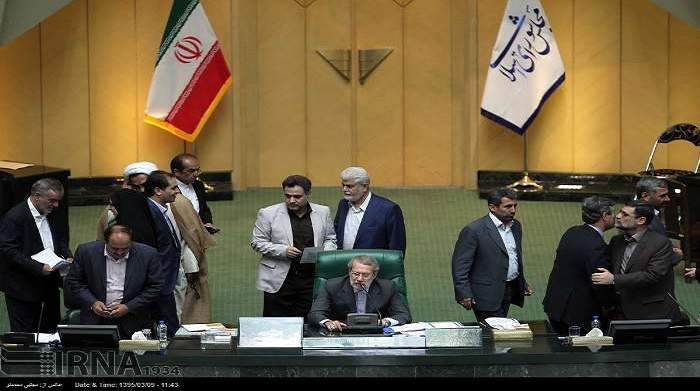Reformists Betrayed By Fair-Weather Allies?

The latest episode of political weigh-ins in Iran shows the principlists are still in power. Iran’s recently inaugurated Majlis has voted for Ali Larijani to remain as Speaker. Larijani won the post with 173 votes in a race against Mohammad Reza Aref, fielded by the Reformist camp, who secured only 103 votes, according to PressTV. The election was meant to temporarily determine the Speaker and the governing board of the Iranian parliament. Permanent members will be decided for a period of one year after at least two-thirds of the MPs’ credentials are approved.
Elsewhere in the parliament’s high places, Massoud Pezeshkian’s third term in Majlis has also become a charm for him to be elected as the first deputy speaker. The reformist former Health Minister won 154 votes, securing a wide margin with Mohammad Dehghan who obtained 136 votes and became the second deputy speaker. Dehghan is a member of the radical principlist group Jebheh Paydari (literally Resistance Front), a loudmouth minority in the sitting Majlis.
According to ISNA, those elected as the parliament’s secretaries of the presiding board, however, are affiliated closely with the principlists in most cases. The ubiquitous Paydari is a real clan. Amirhossein Ghazizadeh Hashemi, the front’s spox, and Ahmad Amirabadi Farahani are self-proclaimed members. Another elected member was backed by the front during the election while two more are coming from the principlist camp. The only member of the board coming from the ‘list of hope’ is the Sunni Abdul-Karim Hosseinzadeh. This is the first time a Sunni reaches the board. Mohammad-Ghassim Osmani is yet another Sunni Kurd who has been chosen as a supervisory member of the panel.
While the reformist/moderate coalition, dubbed “Hope” and headed by Mohammad Reza Aref, had illuminated their strategy of interaction for the Speakership, Ali Larijani gave them the cold shoulder. Last week, he reportedly questioned the impact of the support he received from the reformists’ side in his election from the city of Qom. The reformists said he had also failed to welcome emissaries from the camp, in a gesture of satiety just after he got over the hump on his way to the chair.
Larijani has done more or less the same to Paydari. Back in 2013, on the anniversary of the Islamic Revolution, Larijani’s speech in the shrine of Fatema Ma’sume was interrupted when an apparently pious group started chanting slogans against him. Shoes and clay turbahs were thrown at him. The protestors carried posters of the then President Ahmadinejad. It was later said that Paydari was behind the episode.
However, Paydari has demonstrated the tricks it had up its sleeve to twist the plot in the midst of the tenth parliament’s first show of hands. The front has so far declined to reveal the real number of members it has gotten elected into the Majlis. It is speculated that they have not obtained anything more than forty seats. Thus, seeing itself in a minor position, it first put aside differences with other principlists and joined an umbrella coalition. The front then denied reports that they would introduce their own candidate into the Speakership race and declared support for Larijani in a move that was interpreted as an interim plot to bar Aref from the chair.
This has now apparently paid off. As Aref is standing aside from the main race in the election, Paydari members are threateningly claiming important seats with what seems to be a behind-the-scenes green light from the now unrivaled all-time Majlis Speaker Ali Larijani. The hardline radical group might be an ace in the hole for Larijani to keep the reformists on a tight leash and balance the powers within Majlis. Rouhani’s administration seems not to mind, either. Paydari might cause slight inconveniences for the administration, but has proven to have no real functional capability when it comes to paramount legislative decisions.
The reformists on the other hand have lost one of their best potential candidates for future presidential elections. Larijani, Paydari and the Rouhani administration have written the burn notice on Aref, one of the very few reformists who is still able to pass through the Guardian Council’s fine-grained sieve. Though the reformist camp says the hundred plus seats they have won exceeds their expectations trying to hail their hard-fought victory, the truth is many of the voters who ardently backed them in the twin February elections are disillusioned.

